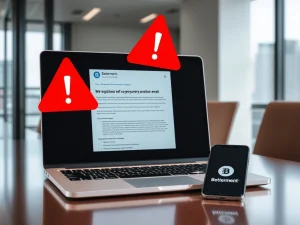Urgent Warning: UK Lawmaker’s X Account Hacked in Brazen Crypto Scam

In a startling turn of events, the X (formerly Twitter) account of a prominent UK lawmaker, Lucy Powell, Leader of the House of Commons, was compromised. The attackers leveraged her platform to promote a dubious cryptocurrency scheme dubbed ‘House of Commons Coin.’ This incident throws a spotlight on the growing trend of crypto scams targeting high-profile individuals and their social media platforms. Let’s dive into the details of this audacious hack and what it means for the crypto world.
UK Lawmaker’s X Account Becomes Latest Victim in Crypto Scams
On April 15th, unsuspecting followers of Lucy Powell’s X account were met with a series of promotional posts for a token called ‘House of Commons Coin’ (HOC). These now-deleted tweets presented HOC as a ‘community driven digital currency.’ However, it was quickly revealed that this was not an endorsement from the MP but rather a result of a security breach. A member of Powell’s staff confirmed the hack to the BBC, assuring that immediate action was taken to secure the account and remove the misleading posts. This swift response was crucial in mitigating the potential damage of this crypto scam.
House of Commons Coin: A Scam Token with Fleeting Fame
Despite the illicit promotion through a high-profile account, the ‘House of Commons Coin’ failed to gain significant traction. Data from DEX Screener indicates that the token reached a peak market capitalization of just over $24,000 shortly after the scam posts. The trading volume remained low at around $71,000 across 736 transactions. This limited success underscores that while exploiting hacked accounts can create initial buzz, savvy crypto investors are increasingly cautious of such blatant crypto scams. The incident serves as a reminder of the importance of due diligence in the volatile world of digital currencies.
Political Figures Crypto Endorsements and Scams: A Troubling Trend
While Lucy Powell herself has no history of promoting cryptocurrencies, the incident unfortunately aligns with a concerning trend of political figures crypto involvement, both legitimate and illicit. The article highlights examples of:
- Donald Trump and Melania Trump: Launched and promoted memecoins prior to entering the White House, drawing criticism.
- Javier Melei (Argentine President): Promoted LIBRA token, which subsequently crashed, leading to political scandal and investigations.
These examples, alongside the ‘House of Commons Coin’ scam, illustrate a spectrum of political figures crypto engagement, ranging from genuine endorsements to unwitting promotion through hacked accounts. The common thread is the potential for misuse and the need for heightened awareness and regulation.
X Account Hack: Echoes of Ghana President’s Crypto Scam Incident
This isn’t the first time a X account hack has been used to push crypto scams involving political figures. Just last month, Ghana’s President John Mahama experienced a similar breach. For a staggering 48 hours, attackers controlled his account, promoting a scam cryptocurrency named ‘Solanafrica’ to his 2.4 million followers. The scammers falsely claimed the project had support from Solana and the Bank of Ghana, promising ‘fast and free payments across the continent.’ President Mahama’s spokesman confirmed the restoration of the account and urged the public to disregard the fraudulent crypto posts. These repeated incidents underscore the vulnerability of high-profile social media accounts and the sophisticated tactics employed by scam operators.
Protecting Yourself from Crypto Scams: Actionable Insights
The ‘House of Commons Coin’ incident and similar X account hack scams serve as stark reminders of the risks in the crypto space. How can you protect yourself?
- Verify Information: Always double-check any crypto endorsement, even if it appears to come from a trusted source. Official accounts can be compromised.
- Due Diligence: Research any cryptocurrency thoroughly before investing. Look beyond celebrity endorsements or social media hype.
- Be Skeptical of Promises: Scams often promise unrealistic returns or quick riches. If it sounds too good to be true, it probably is.
- Account Security: Enable two-factor authentication (2FA) on all your social media and crypto accounts to add an extra layer of protection.
- Report Suspicious Activity: If you encounter a potential scam, report it to the platform and relevant authorities.
Conclusion: Vigilance is Key in the Fight Against Crypto Scams
The attempted ‘House of Commons Coin’ crypto scam, leveraging a UK lawmaker‘s hacked X account, is a concerning development but also a crucial learning opportunity. It highlights the evolving sophistication of scammers and the need for constant vigilance in the cryptocurrency world. As the lines between traditional finance and digital assets blur, and as political figures crypto involvement increases, staying informed and practicing robust security measures are paramount to safeguarding yourself from falling victim to these insidious schemes. The fight against crypto scams is ongoing, and awareness is our strongest weapon.






